Abdul Khaliq al-Ghujdawani
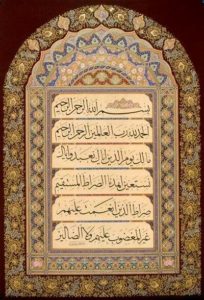 The lights of some people precede their dhikr, while the dhikr of some people precede their lights. There is the one who does (loud) dhikr so that his heart be illumined; and there is the one whose heart has been illumined and he does (silent) dhikr
The lights of some people precede their dhikr, while the dhikr of some people precede their lights. There is the one who does (loud) dhikr so that his heart be illumined; and there is the one whose heart has been illumined and he does (silent) dhikr
Ibn Ata’Allah
He was known as the Shaikh of Miracles, One Who Shone Like the Sun, and he was the Master of the high stations of spirituality of his time. He was a Perfect Knower (carif kamil) in sufism and accomplished in asceticism. He is considered the Fountainhead of this Honorable Sufi Order and the Wellspring of the Khwajagan (Masters of Central Asia).
His father was Shaikh ‘Abdul Jamil, one of the most famous scholars in Byzantine times in both external and internal knowledge. His mother was a princess, the daughter of the king of Seljuk Anatolia.
Abdul Khaliq was born in Ghujdawan, a town near Bukhara in present-day Uzbekistan. There he lived and passed his life and was buried. He was a descendant of Imam Malik (r). In his childhood he studied the Qur’an and its tafsir(exegesis), ‘ilm al-Hadith (the study of Prophetic Traditions), the sciences of the Arabic language, and Jurisprudence with Shaikh Sadruddin. After mastering Sharica (the legal sciences) he moved on to jihad an-nafs (spiritual struggle), until he reached a high station of purity. He then moved to Damascus, where he established a school from which many students graduated. Each became a master of fiqh and hadith as well as spirituality, both in the regions of Central Asia as well as in the Middle East.
The author of the book al-Hada’iq al-Wardiyya tells us how he reached his high station within the Golden Chain: “He met Khidr (as) and accompanied him. He took from him heavenly knowledge and added it to the spiritual knowledge he had obtained from his shaikh, Yusuf al-Hamadani.
“One day when he was reading the Qur’an in the presence of Shaikh Sadruddin, he came upon the following ayat: “Call unto your Sustainer humbly, and in the secrecy of your hearts. Verily, He loves not those who transgress the bounds of what is right”
“From that time Shaikh Abdul Khaliq al-Ghujdawani waited for that prayer to be fulfilled. One day he met Khidr who told him, ‘Now, my son, I have permission from the Prophet to inspire on your tongue and in your heart the hidden dhikr with its numbers.’ He ordered him to submerge himself under water and to begin making dhikr in his heart (LA ILAHA ILLALLAH MUHAMMADUN RASUL ALLAH). He did this form of dhikr every day, until the Light of the Divine, the Wisdom of the Divine, the Love of the Divine and the Attraction of the Divine were opened to his heart. Because of those gifts people began to be drawn to Abdul Khaliq and sought to follow in his footsteps, and he took them to follow in the footsteps of the Prophet .
“He was the first one in this honorable Sufi Order to use the Silent Dhikr and he was considered the master of that form of Dhikr. When his spiritual shaikh, al-Ghawth ar-Rabbani, Yusuf al-Hamadani, came to Bukhara, he spent his time in serving him. He said about him, ‘When I became 22 years of age, Shaikh Yusuf al-Hamadani ordered Khidr to keep raising me and to keep an eye on me until my death.’”
Shaikh Mu ammad Parsa, a friend and biographer of Shah Naqshband, said in his book Faslul-Kitab, that the method of Khwaja Abdul Khaliq al-Ghujdawani in dhikr and the teachings of his Eight Principles were embraced and hailed by all 40 tariqats as the way of truth and loyalty, the way of consciousness in following the Sunnah the Prophet, by leaving innovation and by scrupulously opposing low desires. Because of that he became the Master of his time and the First in this line of spirituality.
His reputation as an accomplished spiritual Master became widespread. Visitors used to flock to see him from every land. He gathered around him the loyal and sincere murids that he was training and teaching. In this regard, he wrote a letter to his son, al-Qalb al-Mubarak Shaykh Awliya al-Kabir, to specify the conduct of followers of this Order. It says:
O my son, I urge you to acquire knowledge and righteous conduct and the fear of Allah. Follow the steps of the pious Salaf (early generation). Hold fast to the Sunnah of the Prophet , and keep company with sincere believers. Read jurisprudence and life-history of the Prophet and Quranic exegesis. Avoid ignorant charlatans, and keep the prayer in congregation. Beware of fame and its danger. Be among the ordinary people and do not seek positions. Don’t enter into friendship with kings and their children nor with the innovators. Keep silent, don’t eat excessively and don’t sleep excessively. Run away from people as you would run from lions. Keep seclusion. Eat lawful food and leave doubtful actions except in dire necessity. Keep away from love of the lower world because it might fascinate you. Don’t laugh too much, because too much laughter will be the death of the heart. Don’t humiliate anyone. Don’t praise yourself. Don’t argue with people. Don’t ask anyone except Allah. Don’t ask anyone to serve you. Serve your shaikhs with your money and power and don’t criticize their actions. Anyone who criticizes them will not be safe, because he doesn’t understand them. Make your deeds sincere by intending them only for Allah. Pray to Him with humbleness. Make your business jurisprudence, your mosque your house, and your Friend your Lord.
The Principles of the Naqshbandi Way
‘Abdul Khaliq al-Ghujdawani coined the following phrases which are now considered the principles of the Naqshbandi Sufi Order:
- Conscious Breathing (“Hosh dar dam“)
Hosh means “mind.” Dar means “in.” Dam means “breath.” It means, according to Abdul Khaliq al-Ghujdawani (q), that
the wise seeker must safeguard his breath from heedlessness, coming in and going out, thereby keeping his heart always in the Divine Presence; and he must revive his breath with worship and servitude and dispatch this worship to His Lord full of life, for every breath which is inhaled and exhaled with Presence is alive and connected with the Divine Presence. Every breath inhaled and exhaled with heedlessness is dead, disconnected from the Divine Presence.
Ubaidullah al-Ahrar (q) said, “The most important mission for the seeker in this Order is to safeguard his breath, and he who cannot safeguard his breath, it would be said of him, ‘he lost himself.’”
Shah Naqshband (q) said, “This Order is built on breath. So it is a must for everyone to safeguard his breath in the time of his inhalation and exhalation and further, to safeguard his breath in the interval between the inhalation and exhalation.”
Shaikh Abul Janab Najmuddin al-Kubra said in his book, Fawatih al-Jamal, “Dhikr is flowing in the body of every single living creatures by the necessity of their breath — even without will — as a sign of obedience, which is part of their creation. Through their breathing, the sound of the letter “Ha” of the Divine Name Allah is made with every exhalation and inhalation and it is a sign of the Unseen Essence serving to emphasize the Uniqueness of God. Therefore it is necessary to be present with that breathing, in order to realize the Essence of the Creator.”
The name ‘Allah’ which encompasses the ninety-nine Names and Attributes consists of four letters, Alif, Lam, Lam and the same Hah (ALLAH). The people of Sufism say that the absolute unseen Essence of Allah Exalted and Almighty is expressed by the last letter vowelized by the Alif, “Ha.” It represents the Absolutely Unseen “He-ness” of the Exalted God (Ghayb al-Huwiyya al-Mutlaqa lillah ‘azza wa jall). The first Lam is for the sake of identification (tacrif) and the secondLam is for the sake of emphasis (mubalagha).
Safeguarding your breath from heedlessness will lead you to complete Presence, and complete Presence will lead you to complete Vision, and complete Vision will lead you to complete Manifestation of Allah’s Ninety-Nine Names and Attributes. Allah leads you to the Manifestation of His Ninety-Nine Names and Attributes and all His other Attributes, because it is said, “Allah’s Attributes are as numerous as the breaths of human beings.”
It must be known by everyone that securing the breath from heedlessness is difficult for seekers. Therefore they must safeguard it by seeking forgiveness (istighfar) because seeking forgiveness will purify it and sanctify it and prepare the seeker for the Real Manifestation of Allah everywhere.
- Watch Your Step (“Nazar bar qadam“)
It means that the seeker while walking must keep his eyes on his feet. Wherever he is about to place his feet, his eyes must be there. He is not allowed to send cast his glance here or there, to look right or left or in front of him, because unnecessary sights will veil the heart. Most veils on the heart are created by the pictures which are transmitted from your eyes to your mind during your daily living. These may disturb your heart with turbulence because of the different kinds of desire which have been imprinted on your mind. These images are like veils on the heart. They block the Light of the Divine Presence. This is why Sufi saints don’t allow their followers, who have purified their hearts through constant Dhikr, to look at other than their feet. Their hearts are like mirrors, reflecting and receiving every image easily. This might distract them and bring impurities to their hearts. So the seeker is ordered to lower his gaze in order not to be assailed by the arrows of devils.
Lowering the gaze is also a sign of humility; proud and arrogant people never look at their feet. It is also an indication that one is following the footsteps of the Prophet , who when he walked never used to look right or left, but used to look only at his feet, moving steadfastly towards his destination. It is also the sign of a high state when the seeker looks nowhere except towards his Lord. Like one who intends to reach a destination quickly, so too the seeker of Allah’s Divine Presence is moving quickly, not looking to his right or his left, not looking at the desires of this world, but looking only for the Divine Presence.
Imam ar-Rabbani Ahmad al-Faruqi (q) said in the 295th letter of his Maktubat:
The gaze precedes the step and the step follows the gaze. The Ascension to the high state is first by the Vision, followed by the Step. When the Step reaches the level of the Ascension of the Gaze, then the Gaze will be lifted up to another state, to which the Step follows in its turn. Then the Gaze will be lifted even higher and the Step will follow in its turn. And so on until the Gaze reaches a state of Perfection to which it will pull the Step. We say, ‘When the Step follows the Gaze, the murid has reached the state of Readiness in approaching the Footsteps of the Prophet, peace be upon him. So the Footsteps of the Prophet are considered the Origin of all steps.
Shah Naqshband (q) said, “If we look at the mistakes of our friends, we will be left friendless, because no one is perfect.”
- Journey Homeward (“safar dar watan“)
It means to travel to one’s homeland. It means that the seeker travels from the world of creation to the world of the Creator. It is related that the Prophet said, “I am going to my Lord from one state to a better state and from one station to a higher station.” It is said that the seeker must travel from the Desire for the forbidden to the Desire for the Divine Presence.
The Naqshbandi Sufi Order divides that travel into two categories. The first is external journeying and the second is internal journeying. External travel is to travel from one land to another searching for a perfect guide to take and direct you to your destination. This enables you to move to the second category, the internal journey. Seekers, once they have found a perfect guide, are forbidden to go on another external journey. In the external journey there are many difficulties which beginners cannot endure without falling into forbidden actions, because they are weak in their worship.
The second category is internal journeying. Internal journeying requires the seeker to leave his low manners and move to high manners, to throw out of his heart all worldly desires. He will be lifted from a state of uncleanness to a state of purity. At that time he will no longer be in need of more internal journeying. He will have purified his heart, making it pure like water, transparent like crystal, polished like a mirror, showing the realities of all matters essential for his daily life, without any need for external action on his part. In his heart will appear everything that is needed for his life and for the life of those around him.
- Solitude in the Crowd (“khalwat dar anjuman“)
“Khalwat” means seclusion. It means to be outwardly with people while remaining inwardly with God. There are also two categories of seclusion. The first is external seclusion and the second is internal seclusion.
External seclusion requires the seeker to seclude himself in a private place that is empty of people. Staying there by himself, he concentrates and meditates on Dhikrullah, the remembrance of God, in order to reach a state in which the Heavenly Realm becomes manifest. When you chain the external senses, your internal senses will be free to reach the Heavenly Realm. This will bring you to the second category: the internal seclusion.
The internal seclusion means seclusion among people. Therein the heart of the seeker must be present with his Lord and absent from the Creations while remaining physically present among them. It is said, “The seeker will be so deeply involved in the silent Dhikr in his heart that, even if he enters a crowd of people, he will not hear their voices. The state of Dhikr overcomes him. The manifestation of the Divine Presence is pulling him and making him unaware of all but his Lord. This is the highest state of seclusion, and is considered the true seclusion, as mentioned in the Holy Qur’an: ”Men whom neither business nor profit distract from the recollection of God” [24:37]. This is the way of the Naqshbandi Order.
The primary seclusion of the shaykhs of the Naqshbandi Order is the internal seclusion. They are with their Lord and simultaneously they are with the people. As the Prophet said, “I have two sides: one faces my Creator and one faces creation.” Shah Naqshband emphasized the goodness of gatherings when he said: Tariqatuna as-suhbat wa-l-khairu fil-jamciyyat (“Our Way is Companionship, and Goodness is in the Gathering”).
It is said that the believer who can mingle with people and carry their difficulties is better than the believer who keeps away from people. On that delicate point Imam Rabbani said,
It must be known that the seeker at the beginning might use the external seclusion to isolate himself from people, worshipping and concentrating on Allah, Almighty and Exalted, until he reaches a higher state. At that time he will be advised by his shaikh, in the words of Sayyid al-Kharraz, ‘Perfection is not in exhibitions of miraculous powers, but perfection is to sit among people, sell and buy, marry and have children; and yet never leave the presence of Allah even for one moment.
- Essential Remembrance (“yad kard“)
The meaning of ‘Yad’ is Dhikr. The meaning of ‘kard‘ is the essence of Dhikr. The seeker must make Dhikr by negation and affirmation on his tongue until he reaches the state of the contemplation of his heart (muraqaba). That state will be achieved by reciting every day the negation (LA ILAHA) and affirmation (ILLALLAH) on the tongue, between 5,000 and 10,000 times, removing from his heart the elements that tarnish and rust it. This dhikr polishes the heart and takes the seeker into the state of Manifestation. He must keep that daily dhikr, either by heart or by tongue, repeating ALLAH, the name of God’s Essence which encompasses all other names and Attributes, or by negation and affirmation through the saying of LA ILAHA ILLALLAH.
This daily dhikr will bring the seeker into the perfect presence of the One Who is glorified.
The Dhikr by negation and affirmation, in the manner of the Naqshbandi Sufi Masters, demands that the seeker close his eyes, close his mouth, clench his teeth, glue his tongue to the roof of his mouth, and hold his breath. He must recite the dhikr through the heart, by negation and affirmation, beginning with the word LA (“No”). He lifts this “No” from under his navel up to his brain. Upon reaching his brain the word “No” brings out the word ILAHA (“god”), moves from the brain to the left shoulder, and hits the heart with ILLALLAH (“except The God”). When that word hits the heart its energy and heat spreads to all the parts of the body. The seeker who has denied all that exists in this world with the words LA ILAHA, affirms with the words ILLALLAH that all that exists has been annihilated in the Divine Presence.
The seeker repeats this with every breath, inhaling and exhaling, always making it come to the heart, according to the number of times prescribed to him by his shaikh. The seeker will eventually reach the state where in one breath he can repeat LA ILAHA ILLALLAH twenty-three times. A perfect shaikh can repeat LA ILAHA ILLALLAH an infinite number of times in every breath. The meaning of this practice is that the only goal is ALLAH and that there is no other goal for us. To look at the Divine Presence as the Only Existence after all this throws back into the heart of the murid the love of the Prophet and at that time he says, MUHAMMADUN RASULULLAH (“Muhammad is the Prophet of God”) which is the heart of the Divine Presence.
- Returning (“baz gasht“)
This is a state in which the seeker, who makes Dhikr by negation and affirmation, comes to understand the Holy Prophet’s phrase, ilahi anta maqsusdi wa ridaka matlubi (“O my God, You are my Goal and Your Good Pleasure is my Aim.”) The recitation of this phrase will increase in the seeker the awareness of the Oneness of God, until he reaches the state in which the existence of all creation vanishes from his eyes. All that he sees, wherever he looks, is the Absolute One. The Naqshbandi murids recite this sort of dhikr in order to extract from their hearts the secret of Oneness, and to open themselves to the Reality of the Unique Divine Presence. The beginner has no right to leave this dhikr if he doesn’t find its power appearing in his heart. He must keep on reciting it in imitation of his Shaykh, because the Prophet has said, “Whoever imitates a group of people will belong to them.” And whoever imitates his teacher will some day find this secret opened to his heart.
The meaning of the phrase “baz gasht” is the return to Allah Exalted and Almighty by showing complete surrender and submission to His Will, and complete humbleness in giving Him all due praise. That is the reason the Holy Prophet mentioned in his invocation, ma dhakarnaka haqqa dhikrika ya Madhkur (“We did not Remember You as You Deserve to be Remembered, O Allah”). The seeker cannot come to the presence of Allah in his dhikr, and cannot manifest the Secrets and Attributes of Allah in his dhikr, if he does not make dhikr with Allah’s Support and with Allah’s Remembrance of him. As Bayazid said: “When I reached Him I saw that His remembering of me preceded my remembrance of Him.” The seeker cannot make dhikr by himself. He must recognise that Allah is the one making Dhikr through him.
- Attentiveness (“nigah dasht“)
“Nigah” means sight. It means that the seeker must watch his heart and safeguard it by preventing bad thoughts from entering. Bad inclinations keep the heart from joining with the Divine. It is acknowledged in the Naqshbandiyya that for a seeker to safeguard his heart from bad inclinations for fifteen minutes is a great achievement. For this he would be considered a real Sufi. Sufism is the power to safeguard the heart from bad thoughts and protect it from low inclinations. Whoever accomplishes these two goals will know his heart, and whoever knows his heart will know his Lord. The Holy Prophet has said, “Whoever knows himself knows His Lord.”
One Sufi shaikh said, “Because I safeguarded my heart for ten nights, my heart has safeguarded me for twenty years.”
Abu Bakr al-Qaittani said, “I was the guard at the door of my heart for 40 years, and I never opened it for anyone except Allah, Almighty and Exalted, until my heart did not know anyone except Allah Almighty and Exalted.”
Abul Hassan al-Kharqani said, “It has been 40 years that Allah has been looking at my heart and has seen no one except Himself. And there is no room in my heart for other than Allah.”
- Recollection (“yada dasht“)
It means that the reciter of Dhikr safeguards his heart with negation and affirmation in every breath without leaving the Presence of Allah Almighty and Exalted. It requires the seeker to keep his heart in Allah’s Divine Presence continuously. This allows him to realize and manifest the Light of the Unique Essence (anwar adh-dhat al-Ahadiyya) of God. He then casts away three of the four different forms of thoughts: the egoistic thoughts, the evil thoughts, and the angelic thoughts, keeping and affirming solely the fourth form of thought, the haqqani or truthful thoughts. This will lead the seeker to the highest state of perfection by discarding all his imaginings and embracing only the Reality which is the Oneness of Allah, Almighty and Exalted.
‘Abdul Khaliq al-Ghujdawani had four khalifs. The first was Shaikh Ahmad as-Siddiq, originally from Bukhara. The second was Kabir al-Awliya (“the Greatest of Saints”), Shaikh Arif Awliya al-Kabir (q). Originally from Bukhara, he was a great scholar in both external and internal Sciences. The third khalif was Shaikh Sulaiman al-Kirmani (q). The fourth khalif was cArif ar-Riwakri (q). It is to this fourth khalif that Abdul Khaliq (q) passed the Secret of the Golden Chain before he died on the 12th of Rabi’ul-Awwal 575 H.


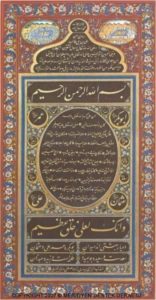 Whoever enters the Way without a guide will take a hundred years to travel a two-day journey.
Whoever enters the Way without a guide will take a hundred years to travel a two-day journey.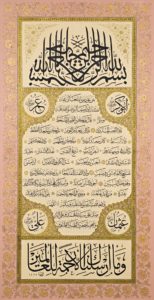 Think not that there are no travelers on the road,
Think not that there are no travelers on the road,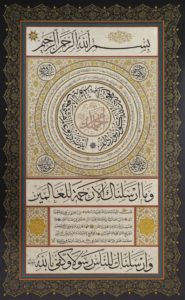 O child! said Luqman the Wise,
O child! said Luqman the Wise,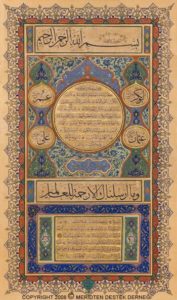 Mayest Thou deign to be sweetness and let life be bitter!
Mayest Thou deign to be sweetness and let life be bitter!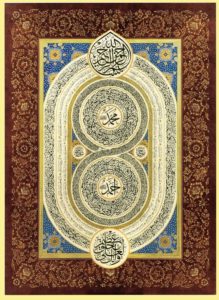 I have planted love in my heart
I have planted love in my heart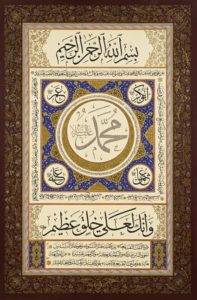 I have discovered — and exaggeration is not in my nature –
I have discovered — and exaggeration is not in my nature –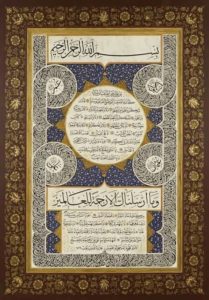 So long as you have not contemplated the Creator,
So long as you have not contemplated the Creator,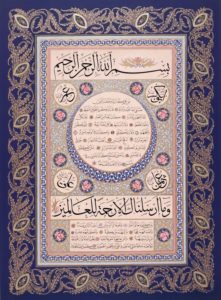 My heart has become able to wear all forms:
My heart has become able to wear all forms: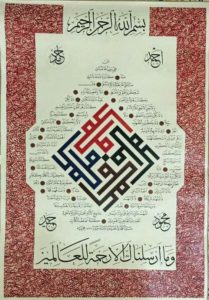 The moon traverses the constellations of the zodiac in a single night,
The moon traverses the constellations of the zodiac in a single night,